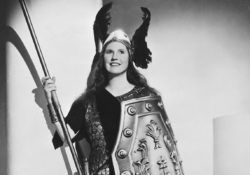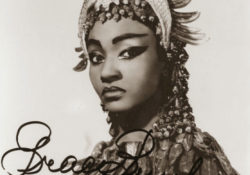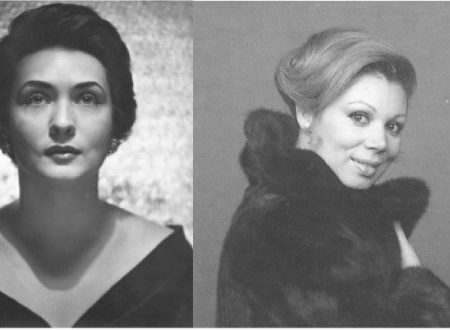Part of Iconic Voices of the Past, a series from Singers on Singing
Above: Dame Janet Baker
(For more information about the Singers on Singing: Iconic Voices of the Past series, please visit the series page.)
List of Singers and Excerpts
Conchita Supervia (coloratura mezzo)
ROSSINI: LA CENERENTOLA, “Non piùmesta”
Jennie Tourel (lyric)
LA PÉRICHOLE, “O moncheramant”
Nan Merriman (lyric mezzo)
Falla, SIETE CANCIONES POPULARES ESPAÑOLAS, first two songs – “El PañnoMoruno” and “Seguidillla Murciana”
Dame Janet Baker (lyric mezzo)
LES NUITS D’ÉTÉ, “Villanelle”
Irene Minghini-Cattaneo (dramatic mezzo)
VERDI REQUIEM MASS, Liber scriptus
Irina Arkhipova (dramatic mezzo)
THE MAID OF ORLÉANS, Joan’s Act IV monologue
Christa Ludwig (dramatic mezzo)
DIE WALKÜRE, “So ist es dennaus”
Grace Bumbry (dramatic mezzo)
DON CARLO, “O don fatale”
Giulietta Simionato (Fach-less mezzo — coloratura, lyric, dramatic);
L’ITALIANA IN ALGERI, “Già so per pratica”
I CAPULETI E I MONTECCHI, “Dehtu, bell’anima”
ADRIANA LECOUVREUR, “Acerba voluttà”
Marilyn Horne (coloratura contralto)
SEMIRAMIDE, “Ah, come da queldì”
Marian Anderson (concert contralto)
Schubert, “Der Tod und das Mädchen”
Kathleen Ferrier (concert contralto)
MESSIAH, “He was despised”
Jean Madeira (dramatic contralto)
DAS RHEINGOLD, “Weiche, Wotan, weiche”
Oralia Dominguez (dramatic contralto)
SAMSON ET DALILA, “Amour, viens aider ma faiblesse”
Conchita Supervia (coloratura mezzo)
ROSSINI: LA CENERENTOLA, “Non piùmesta”
All is now well: Cenerentola (Cinderella) and her prince, Don Ramiro, are united. In the opera’s final scene, the couple appear together before the court and Cenerentola’s family. She expresses her utter amazement that, after having lived in such misery for so long, she could now be so happy. Turning to her father and stepsisters, she begs them to accept her as daughter, sister, and friend. Finally she exclaims, “No longer will I sit sadly by the fire.My long life of fear changed like a bolt of lightning, a dream, a game.”
Jennie Tourel (lyric)
OFFENBACH: LA PÉRICHOLE, “O moncheramant”
A pair of impoverished street singers, Périchole and Piquillo, arrive in Lima, Peru, and are unsuccessful in earning any money to buy a marriage license. While Piquillo is off investigating other possible money-making opportunities, Périchole is persuaded by the Viceroy of Peru to come to his palace and become a lady-in-waiting. Her aria takes the form of a sweetly affectionate farewell letter to Piquillo, in which she admits that, although she loves him, she finds their life too difficult and that it’s best if they part.
Nan Merriman (lyric mezzo)
FALLA, SIETE CANCIONES POPULARES ESPAÑOLAS, first two songs – “El Pañno Moruno” and “Seguidillla Murciana”
El Paño Moruno” speaks about a delicate fabric in a shop; a stain fell on it, which means it is now being sold for less because it no longer has any value. The basic message of the “Seguidilla Murciana” the singer says to his lover that because of her many episodes of infidelity, he’ll compare her to a coin that’s passed from one hand to another “till it’s finally consumed, and believing it to be false, no one will take it.”
Dame Janet Baker (lyric mezzo)
BERLIOZ, LES NUITS D’ÉTÉ, “Villanelle”
In the first of Théophile Gautier’s poems for Berlioz’s six-song cycle, the singer anticipates that when the cold is over, he and his beloved will go to gather lilies of the valley and listen to the blackbirds. Spring has arrived! Having departed from their path, the lovers will soon return with a basket of strawberries they’ve gathered in the woods.
Irene Minghini-Cattaneo (dramatic mezzo)
VERDI REQUIEM MASS, Liber scriptus
Within the "Dies irae" section of the Verdi Requiem are nine contrasting sections, of which the fourth is the "Liber scriptus" for the work's mezzo-soprano soloist. In fierce tones covering a wide vocal range, she declares that a book will be presented that includes all things for which the world must be judged. Then, when the almighty judge is seated, everything hitherto hidden will finally be revealed, with nothing remaining that will be unavenged.
Irina Arkhipova (dramatic mezzo)
TCHAIKOVSKY: THE MAID OF ORLÉANS, Joan’s Act IV monologue
The 17-year-old Joan of Arc, having vowed to remain chase, has led the French army to victory, but she falls in love with a knight who is her enemy – Lionel of Burgundy. The people of France are celebrating Joan’s victory when her father publicly accuses her of conspiring with Satan and asks her to prove that she is holy and pure. Her feelings for Lionel keep her from responding, at which all denounce her. Alone in the forest, she wonders how she, as a young mortal woman, could give up the soul she’d promised to God, but suddenly Lionel appears and she greets him ecstatically.
Christa Ludwig (dramatic mezzo)
WAGNER: DIE WALKÜRE, “So ist es dennaus”
Fricka is the wife of the king of the gods, Wotan, and herself the goddess of marriage. She expresses her outrage to Wotan over what has happened on earth: Sieglinde, married to Hunding, has fallen in love with her long-lost brother, the hero Siegmund, and the two have run away together. Fricka can’t believe that Wotan would ignore the fact that the vows of marriage have been violated in this way.
Grace Bumbry (dramatic mezzo)
VERDI: DON CARLO, “O don fatale”
Princess Eboli has been rejected by Don Carlo, son of Spain’s King Philip II.The jealous Eboli realizes that Carlo is in love with his youthful stepmother, Queen Elisabeth. Eboli later confesses to Elisabeth that she not only unjustly accused Elisabeth to the King, but also that she, Eboli, has been the King’s mistress.Elisabeth forces her to choose between exile and a convent. Alone, Eboli curses her own beauty and expresses remorse for her conduct. Remembering that she has one more day, she resolves to save the imprisoned Carlo.
Giulietta Simionato (as coloratura mezzo)
ROSSINI: L’ITALIANA IN ALGERI, “Già so per pratica”
The captive Isabella declares that, through her feminine wiles, she’ll easily get the better of Mustafà, the Bey of Algiers.
Giulietta Simionato (as lyric mezzo)
BELLINI: I CAPULETI E I MONTECCHI, “Dehtu, bell’anima”
At Giulietta’s tomb, the devastated Romeo begs her to take him with her to heaven.
Giulietta Simionato (as dramatic mezzo)
CILEA: ADRIANA LECOUVREUR, “Acerba voluttà”
The Princess di Bouillon eagerly anticipates her rendezvous with the handsome Count Maurizio. Fervently she hails the evening star, begging it never to fade but rather, to shine on the whole universe and to guard her love.
Marilyn Horne (coloratura contralto)
ROSSINI: SEMIRAMIDE, “Ah, come da queldì”
Semiramide, Queen of Babylon, is under pressure to name a successor to her husband, the consort. Arsace, commander of her army, has been called back to Babylon by Semiramide, but he doesn’t know why. In his entrance scene, he remembers that his late father had told him to visit the temple of Babylon. He remembers, too, the love he feels for the beautiful princess Azema, whom he’d once rescued from harm.
Marian Anderson (concert contralto)
Schubert, “Der Tod und das Mädchen”
The text of the poem by Matthias Claudius is for two characters. The girl sings first: beside herself with terror, she begs Death to leave her. Death calmly asks for her hand, identifying himself as a friend who doesn’t intend to punish her. In his arms, he assures her, she will sleep gently.
Kathleen Ferrier (concert contralto)
HANDEL: MESSIAH, “He was despised”
In the first aria of Messiah’s second part, the contralto soloist singing the following: “He was despised and rejected of men – a man of sorrows and acquainted with grief. He gave his back to the smiters, and his cheeks to them that plucked off the hair. He hid not his face from shame and spitting.”
Jean Madeira (dramatic contralto)
WAGNER: DAS RHEINGOLD, “Weiche, Wotan, weiche”
Wotan has just forcibly obtained the all-powerful ring from the gnome Alberich, who has cursed the ring and is owner. Erda, the earth-goddess, emerges out of the ground to warn Wotan to give up the ring, because it will bring disaster to the gods.
Oralia Dominguez (dramatic contralto)
SAINT-SAËNS: SAMSON ET DALILA, “Amour, viens aider ma faiblesse”
Samson is the Hebrews’ hero and the Philistines’ greatest foe. Dalila, a priestess of the Philistines’ pagan god Dagon, has enticed Samson to visit her at her home in the valley of Sorek. Awaiting his arrival, Dalila calls on her gods to aid her in her quest to have Samson yield the secret of his power.





